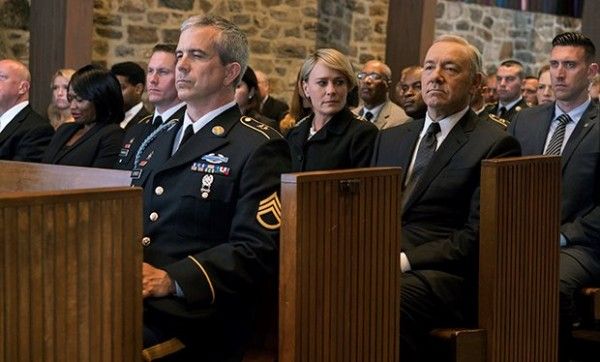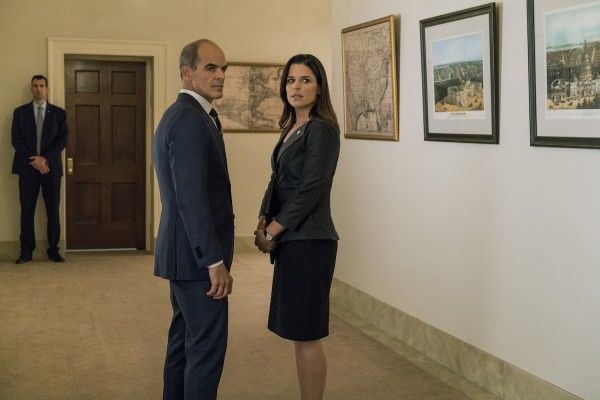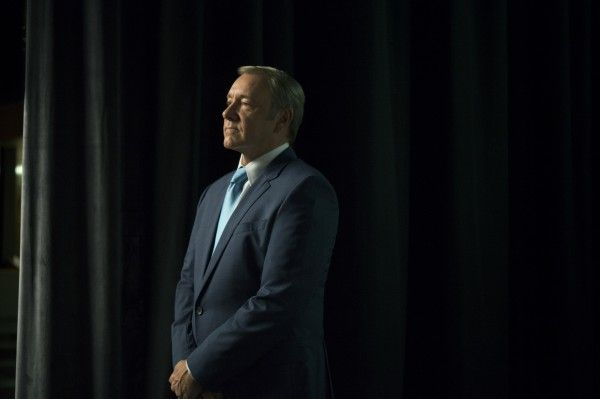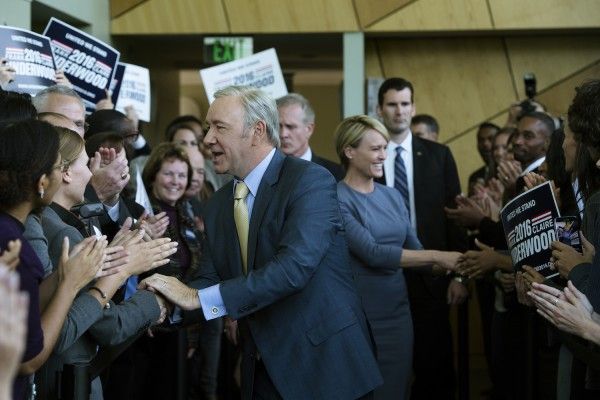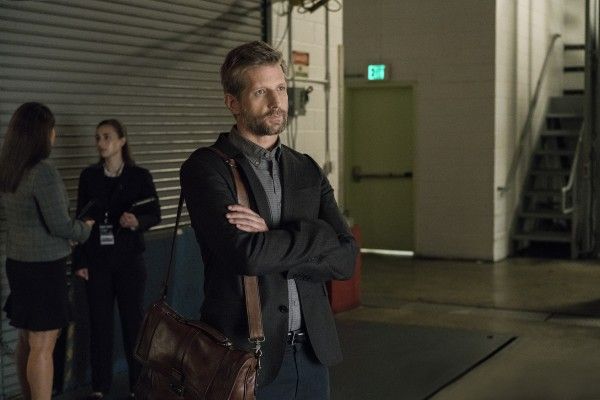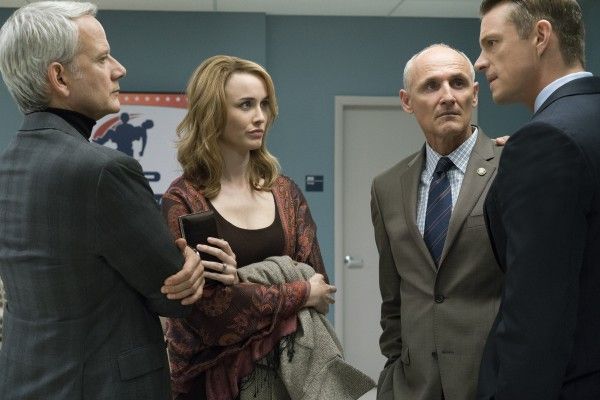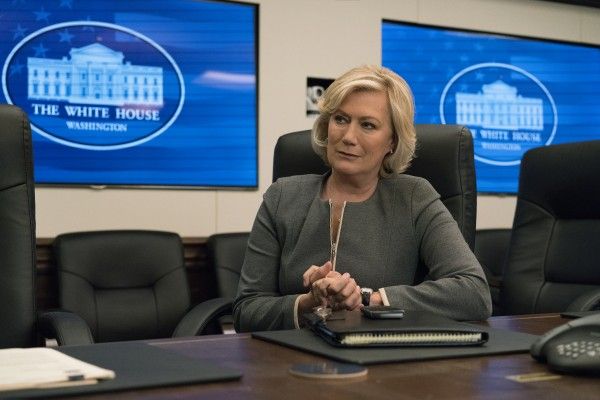One of the most pivotal moments of House of Cards' last season was President Frank Underwood being shot by an isolated detractor and plunged into a woozy, icy deathdream. There he was confronted by two of his most direct victims, Corey Stoll's Peter Russo and Kate Mara's Zoe Barnes, as well as his wife and other haunted figures from his existence as a political survivalist at the top of food chain. The weight and intricacies of the presidency, his complicated marriage (to say the least), and a rogues gallery of foes and colleagues then faded, and we saw Frank cornered, almost without a word, by his bloodiest misdeeds. One could feel the unyielding tap of guilt and the certainty of a reckoning bubbling under the scene, like schools of fish rushing under a frozen lake top.
It's a moment of measured expressive flourish in a series that has always shot for atmosphere, mood, and grandeur, with memories and ideas tearing through the veneer of the show's web of betrayals, double-dealings, and outright crimes in order to reveal something intimate about a character. One could see similar ruptures in Frank's relationship with a local rib joint and his visit to a confederate burial ground, amongst a host of other flecks of inspired imagination that have added a crucial element of theatrical oomph to the thicket of thematic concepts and technical, jargon-heavy dialogue. Much of these moments involved the repression of parts of Frank's identity that could keep him away from his most coveted seat in the government, and now that he both has this power and must contend with a genuine threat to his grasp on that power from Joel Kinnaman's William Conway, the Governor of New York and Frank's Republican opponent, these shattering, imaginative swirls should be coming up more often. That Season 5 of Netflix's flagship program doesn't feature much in the way of drawing out the wild interior lives of these characters is one of the primary reasons that the show feels stuck on autopilot. Fair warning: spoilers ahead!
As the fifth season of House of Cards begins, we pick up just where we left off in the aftermath of the execution of James Miller, a young husband and father, by domestic terrorists (of sorts). His death was caused in no small part by Frank's need for a political win, fueled by Kinnaman's handsome, tech-savvy veteran's gains in the polls. The new season moves breezily from the burial of the soldier to the election, which ends with a series of states not certifying their votes and therefore kicking the election to the House and Senate. The intricate and yet not so complicated governmental rules are laid out in an opening fourth-wall-breaking speech from Frank in "Chapter 57," and Kevin Spacey gives the dialogue his reliably rhythmic, seductive theatrical touches in delivery and uses the space outside the Lincoln Memorial as a stage with masterful confidence. Frank speaks about a preposterous set of circumstances that would leave the nation in a state of emotional and societal disarray with utter control and not even a slight hint of nervosa.
This is a familiar happening in the world of the Netflix series, and it's what's made House of Cards feel increasingly detached from its substantial and fascinating subject material in the last season and in the most current season. For all the encyclopedic knowledge that Frank, Claire, Stamper, and the rest of the Underwood team seem to have on hand to essentially enact dictatorial rule through the series of legislative loopholes, bringing it all down to a coin flip, there's never much of a sense of rumination. There's rarely a moment where Frank or really anyone seems to be working a problem out in time, no pause in the rampant pacing of the cumbersome, unwieldy plot to convey the idea that one of these characters doesn't have the solution to every political problem at hand in under 24 hours. There's no emotional issue that isn't capable of being quickly unknotted, and no inner moral compass to fidget with when something genuinely unexpected happened, largely because nothing can be unexpected in House of Cards, such as it's written.
To a degree, this is by design. What made Netflix's House of Cards so immediately thrilling in its first season was seeing the perilous balance between vast professional know-how and personal sacrifice play out in a grand scheme to take the White House. And in making the unethical and illegal actions taken to get Frank and Claire in the oval office so entertaining, the show conveyed an essential truth about the political world and those who follow it: sometimes, it really is just about who is more entertaining. The series pivots on the fact that Frank was constantly speaking to us, making us feel like we're in on his whole plan even if we find what he's doing disgraceful or worse. The show's engine depends on the fact that there isn't much under the sun that could easily knock Frank or Claire off their game for any convincing amount of time. In other words, they must be consistent, unshaken performers.
In the age of Trump, who some argue won specifically because he was more fun to watch than Hillary Clinton, this should be even more pronounced and outrageous but where our current political state is ensconced in idiocy, pettiness, and bedlam, the political state in House of Cards' fifth season seems to be continuously in control, even when everyone is insisting that it isn't. When Claire and Frank must once again tangle with Russian leader Viktor Petrov (Lars Mikkelsen) after an incident in Antarctica, there is much talk about the possibility of war but it's really no different in tone or production to the pair's former run-ins with the Russian President. The same goes for the reemergence of Stamper's (Michael Kelly) murder of former informant Rachel (Rachel Brosnahan) and the hunt for proof of the Underwoods' villainy by The Washington Herald, headed by Boris McGiver's Tom Hammerschmidt. Even as the particulars of the 12th amendment begin to open a new set of rules for the Underwoods and the series, the world of House of Cards seems unchanged and more than willing to rely on familiar narrative devices without much change in tone, mood, or even action.
It's not really the fault of creator Beau Willimon or any of the other chief creative forces behind the show that the day-to-day politics under Trump are so catastrophic that a show about the relative sobriety of the government as it stands today seems absurd. And the litany of aesthetic delights and uniformly inventive performances in season 5 of House of Cards still put the series heads and shoulders above the glut of "Peak" TV. That being said, when Willimon and his writers seems so intent on mirroring the real political world within their imagined political world, they call attention to the glaring differences. The constant talk of special committees, Nixon, and pardons toward the end makes it especially difficult not to make connections to the miasma of corruption that the White House is currently emanating. There's even a traitorous general roaming within Willimon's dense yet easily tracked political landscape. The intermittent nods toward self-awareness and laughably easy narrative solutions suggest purposeful theatrical embellishment and potent unrealism but none of the 13 episodes in season 5 go far enough to truly give a sense of the anarchy and insanity of these actions. Hell, even Claire's murder of Tom Yates (Paul Sparks), her lover and biographer of sorts, came off as sober and logical from the perspective of the series and its narrative stride.
The closest this season ever gets to a convincing level of madness is in Frank's trip to Elysian Fields, a men-only retreat for the wealthiest and most powerful amongst us in the style of the infamous Bohemian Grove getaways. To glare into the abyss of white male privilege, stoked to a level of religious fervor, complete with burning effigies and Eyes Wide Shut masks, is a bold reflection of the misogyny and distrust of women that underlines much of the legislative action taken by the modern-day Republican party and more than a fair share of Democrats and Liberals as well. Even the scenes in "Chapter 60" that focus on Frank's time at Elysian Fields, however, are grounded by the demands of realism, in the need to continuously reaffirm a genuinely unbelievable sense that everyone around Frank knows what's going on.
There's one more element of the season that's worth discussing, and that's the portrayal of PTSD in the figure of Conway. From the other side of the glass, Conway's relationship to his time in the military was a hugely promising way of teasing out a severely important issue and tackling it with a measure of sobriety. And up to a point, both Kinnaman and the writers do an admirable job of showing how vulnerable Conway's time at war really made him, and how that effects his relationship with his wife, children, and colleagues. In one memorable scene, he tests out a promising VR program meant to help PTSD victims, the result of which is that his vice president - the aforementioned general - begins to isolate him from any support that isn't the government or the military. Conway is a tragic figure that deserves his own season but his storyline ultimately gets swallowed up by the jargonnauts and the more "insane" yet less liberated narrative of Claire becoming the acting President of the United States while Frank heads into the private sector. It certainly wouldn't be the first time the more ridiculous yet ineffective choice was made over the more bruised yet insightful one.
House of Cards Season 5 is now available for streaming in full on Netflix.


